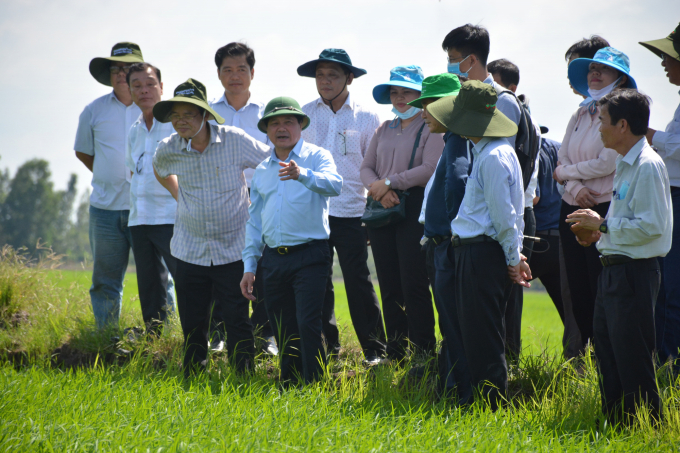Deputy Minister Le Quoc Doanh (left) talks with an agricultural cooperative leader in Hau Giang province. Photo: Tuan Phat.
Not subjective, but more confident
In the last days of 2020, in the fields, farmers in the Mekong Delta are busy sowing and taking care of the 2020-2021 winter-spring crop. Accompanying farmers and Mekong Delta provinces, since the beginning of this rice crop, there have been many field trips from the Department of Crop Production, Ministry of Agriculture and Rural Development.
Most recently, on December 17, 2020, the survey team led by Deputy Minister of Agriculture and Rural Development Le Quoc Doanh arrived in Can Tho City, Hau Giang, Soc Trang and Tra Vinh. Together with the mission, there are many specialized agencies and media.
Deputy Minister Le Quoc Doanh, after going live inspection on the field, met with farmers exuded optimism and confidence. He highly appreciated the preparation of production plans and seasonal calendars that the agricultural sectors of the Mekong Delta provinces applying to farmers in accordance with the guiding of the Ministry of Agriculture and Rural Development.
He said that the rice fields in the Mekong Delta provinces are developing very well, especially in the coastal provinces with a high risk of saltwater intrusion. From last year's experience, farmers have been recommended by specialized branches to proactively sow seeds early. Up to this moment, drought and saltwater intrusion can be confidently avoided.

However, the danger of saltwater intrusion and drought is still likely to occur, it is suggested that localities and people must not be subjective. In order for the 2020 - 2021 winter-spring crop to be completely successful, he suggested that local people focus on sowing the entire remaining rice area in December 2020. Concentrate on using water in the most economical and reasonable way. At the same time, prepare facilities to deal with possible saltwater intrusion and drought, especially from mid to late winter-spring.
Mr. Le Thanh Tung, Deputy Director of the Department of Crop Production, said: By the end of December 2020, the Mekong Delta will sow seeds to more than 1.45/1.55 million hectares as planned, the remaining 100 thousand hectares pass to about 10 January 2021. Currently, the rice price is soaring, so the area could increase by several tens of thousands of hectares.
Through the survey, most of the rice areas located in the areas prone to drought and saltwater intrusion have passed the maximum growth period last year.
Expected to harvest about 200,000 hectares before the Lunar New Year, this area is mostly located in the area prone to drought and saltwater intrusion. Including the Go Cong freshening zone and some coastal areas of Tra Vinh, Soc Trang, Kien Giang, and part of Hau Giang.
Better understanding and adaption
The watercourse in the Mekong Delta depends almost entirely on the flow from the upper Mekong. Therefore, water resources of the Mekong River play a crucial role in influencing saltwater intrusion in the Mekong Delta.
According to the natural law in the Mekong Delta, it is possible to observe the flooding season of the previous year to foresee the drought situation right after the Lunar New Year. This year's dry season, experts also forecast that saltwater intrusion and drought will continue to be fierce.
Deputy Minister Le Quoc Doanh and leaders of the People's Committee of Hau Giang province inspect the winter-spring rice growing area of the province. Photo: Tuan Phat
On a macro perspective, Prime Minister Nguyen Xuan Phuc also posed this issue at a conference to discuss saltwater intrusion and drought on September 23, 2020 in Tien Giang.
“We need to realize that drought, saltwater intrusion is an unavoidable problem, can only be limited and should be a normal story in the life of the Mekong Delta from now on. They are a risk, but at the same time, there are opportunities if we can respond and adapt. There must be a master plan for the Mekong Delta to have a longer-term vision, not be hot, deal each year, ”said the Prime Minister.
Live naturally, depend on natural laws to actively adapt. That knowledge was also recorded into the viewpoints, objectives, orientations and solutions in the Government's Resolution 120/NQ-CP on the development of the Mekong Delta to adapt to climate change.
In this context, the Resolution 120 of the Government is a long-term strategic solution for the Mekong Delta. The central key to the problem is to transform the Mekong Delta agriculture in the spirit of Government's Resolution No. 120 from production quantity to quality.
Resolution 120 defines the strategic pivot to prioritize fisheries and crops. It also specifies that saltwater, brackish water, and fresh water are all natural resources, not just fresh water as before. Understanding and adapting to the laws of nature, we save effort but also take advantage of the opportunities.
"We recall that 2016 was a year of severe drought, and many fields were dry and burned, leading to great damage.
In 2020, there will also be a severe drought, but the damage has decreased significantly. Last year also in Tien Giang, the Prime Minister also chaired a conference on prevention of saltwater intrusion. Thus, there have been many conferences recently, actively directing drastically, so the damage has decreased significantly. Many provinces have handled the problem of drinking water well for the people.
The year 2019-2020 seasion is a good season, the loss due to disaster is only 7-8%. If we take the initiative from the beginning of the year, the damage will be greatly reduced, "Prime Minister Nguyen Xuan Phuc said at the conference on prevention of saltwater intrusion and drought on September 23, 2020 in Tien Giang.